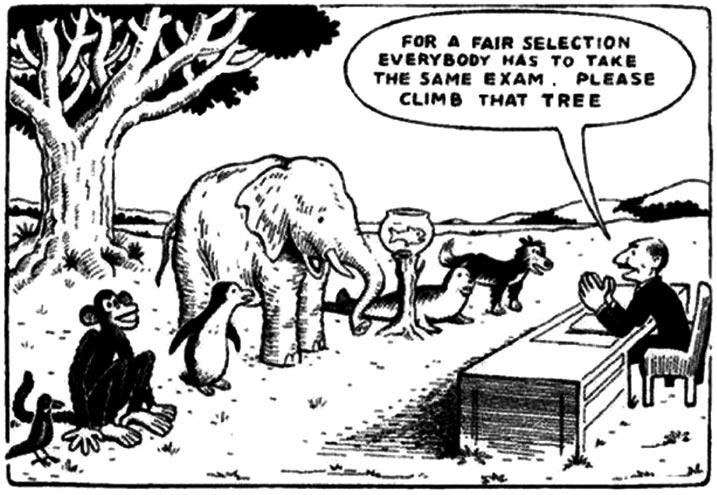
1 minute read
2.5.1: The Different Purposes of Assessment
Assessment in all its forms involves collecting information: an interaction between the assessor and the assessed, that results in decisions being made.
In education, evaluation can satisfy various pedagogical and didactic functions. It can lead to better student-teacher relations, or it can also be used to maintain a calm atmosphere in the classroom or set the pupils into a hierarchy (e.g. level 1, level 2 etc.). Instead, in circus lesson these collateral tasks are not assigned to evaluation, but to other different tools, such as the use of the games, the development of motivation, and the wonder that arises from learning the circus techniques. The assessment is already more used to regulate and empower teaching and learning.
Advertisement
One of the main limitations of a traditional school evaluation system is illustrated in the picture above. How can we use the same kind of tests for completely different individuals?
According to OxfordDictionaries.com, the definition of ‘to educate’ in English is ‘to give intellectual, moral, and social instruction to someone’. Assessment of personal development cannot be standardised, but must change according to the needs of every individual student. An assessment plan should attempt to develop an individualised multi-dimensional model of assessment that is built around students rather than content.
Circus disciplines are characterised by a wide variety of skills and abilities. It is the facilitator’s task to use a variety of methods which will take this into account. Some students will excel in creative skills, but less so in technical progression. Others will excel in strength and skill in acrobatics, or be elegant on aerial silks, or have coordination in juggling and so on. The training process must therefore be facilitated with empathy, observation and connection. In general, continuous discussion and a constant drive towards self-evaluation of one’s own training programme is preferable.
Some trainers on the exchange preferred to use different words to describe this process. ‘Development’ instead of ‘Assessment’, and ‘Evolution’ instead of ‘Evaluation’. This gives us a lot to think about.





